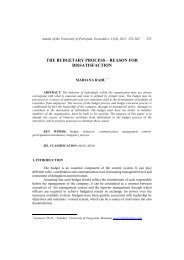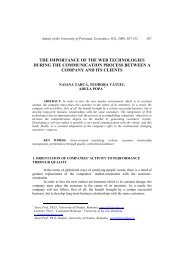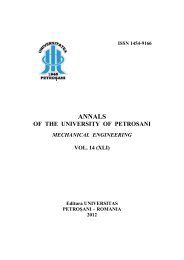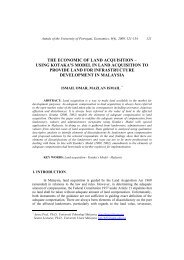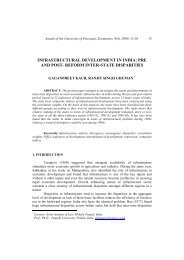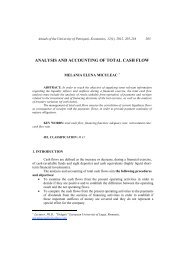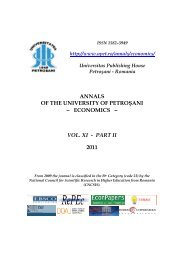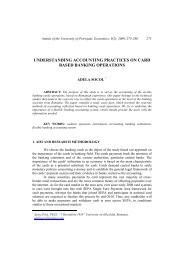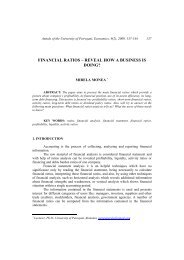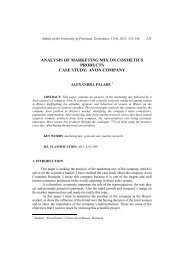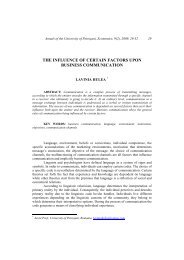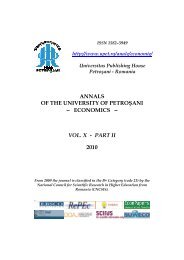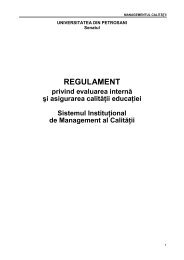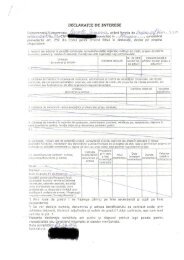annals of the university of petroÅani â¼ economics â¼ vol. xi - part i ...
annals of the university of petroÅani â¼ economics â¼ vol. xi - part i ...
annals of the university of petroÅani â¼ economics â¼ vol. xi - part i ...
Create successful ePaper yourself
Turn your PDF publications into a flip-book with our unique Google optimized e-Paper software.
226 Răvaş, O.<br />
1. Expand or maintain foreign markets by using online tools, such as forex or<br />
ano<strong>the</strong>r foreign exchange program<br />
2. Increase sales<br />
3. Sidestep liquidity problems<br />
4. Repatriate blocked funds<br />
5. Clean up bad debt situations<br />
6. Build customer relationships<br />
7. Keep from losing markets to competitors<br />
8. Gain foreign contracts for future sales<br />
9. Find lower-cost purchasing sources<br />
There are six main types <strong>of</strong> countertrade<br />
1. Offset<br />
2. Counterpurchase<br />
3. Tolling<br />
4. Barter<br />
5. Buyback<br />
6. Switch Trading<br />
1. Offset. Offset has traditionally been used by governments around <strong>the</strong> world<br />
when <strong>the</strong>y have made major purchases <strong>of</strong> military goods but is becoming increasingly<br />
common in o<strong>the</strong>r sectors. There are two distinct types:<br />
- direct <strong>of</strong>fset: "<strong>the</strong> supplier agrees to incorporate materials, components or subassemblies<br />
which are procured from <strong>the</strong> importing country. In some large contracts,<br />
successful bidders may be required to establish local production. Direct <strong>of</strong>fset has been<br />
<strong>part</strong>icularly common for trade in defence systems and aircraft."<br />
- indirect <strong>of</strong>fset: "<strong>the</strong> purchaser requires suppliers to enter into long term industrial (and<br />
o<strong>the</strong>r) co-operation and investment but <strong>the</strong>se are unconnnected to <strong>the</strong> supply contract<br />
and may be ei<strong>the</strong>r defence related or in <strong>the</strong> civil sector."<br />
The overall objective <strong>of</strong> <strong>of</strong>fset ei<strong>the</strong>r, direct or indirect, in <strong>the</strong> defence sector<br />
generally to promote import substitution and to minimise <strong>the</strong> balance <strong>of</strong> payments<br />
deficit for military purchases by developiing an indigenous industrial defence<br />
capability.<br />
2. Counterpurchase. A foreign supplier undertakes to purchase goods and<br />
services from <strong>the</strong> purchasing country as a condition <strong>of</strong> securing <strong>the</strong> order.<br />
Counterpurchase is generally imposed for two reasons: first, to stimulate exports and<br />
second, to alleviate <strong>the</strong> balance <strong>of</strong> payment deficit resulting from imported goods.<br />
3. Tolling. Manufacturers, in regions such as <strong>the</strong> Former Soviet Union, may<br />
sometimes be unable to service customers because <strong>the</strong>y lack <strong>the</strong> foreign exchange to<br />
buy raw materials. In a tolling deal, a supplier himself provides <strong>the</strong> raw material (steel<br />
ingots, say) and hires capacity <strong>of</strong> <strong>the</strong> factory to turn it into finished goods (e.g. steel<br />
tubes). These are <strong>the</strong>n bought by a final customer who pays <strong>the</strong> supplier in cash -<br />
throughout <strong>the</strong> process <strong>the</strong> supplier retains ownership <strong>of</strong> <strong>the</strong> material as it is<br />
procecessed by <strong>the</strong> factory." - this is similar toContract Manufacturing where <strong>the</strong><br />
Contractor provides much <strong>of</strong> <strong>the</strong> materials.



